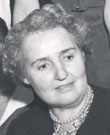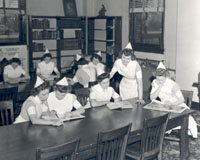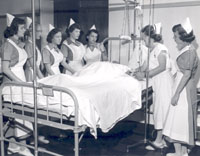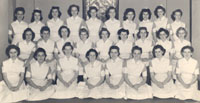In Her Words
“Careers in Nursing” Radio Address by Louise Knapp, April 24, 1943
Louise Knapp, director of the Washington University School of Nursing from September 1940 until November 1961, made this radio address on April 24, 1943. It was part of St. Louis radio station KXOK’s series, “Our World of Work” and briefly described the growing need and opportunities for nurses at that time.
Nurses are needed in greater numbers than ever before. The other day, one of our young head nurses left to join the Army Air Transport Service. She will be responsible for the nursing care of sick and wounded men evacuated from a combat area to a hospital for expert care. Another nurse left with her husband for a west coast Army Post. Other nurses have joined the Army or the Navy Nurse Corps. The positions they have left are hard to fill. We know that 3,000 graduate nurses a month will be needed for the Armed Forces. This represents a constant drain on the nursing groups in St. Louis and other parts of the country. The civilian population needs more not less care than before. More babies are being born; more people come to the hospital for care, made possible through group hospitalization insurance plans.
How can we meet the problem of providing more nurses? The Government has given us the blueprint – Admit 65,000 new students to Schools of Nursing in the coming year! Every student nurse can look forward to a career of useful service when she is a graduate, and during her student experience in the hospital, she will care for patients under the supervision of graduate nurses.
Many girls who wish to take up nursing are discouraged by their parents, who have antiquated ideas about what nurses do, and seem to believe that they spend their time doing menial work, beneath the dignity of their daughters. But, today, nurses do not scrub floors. Their skill is needed for professional tasks. It is true that nurses learn to do many things. They bathe patients of all ages, from the newborn baby to the elderly man with a heart condition. But nursing begins with the simpler procedures, and as the student progresses in the School, she learns more complicated procedures, and is given more responsibility. When she gives medicines, she must know the correct dosage of the various drugs, for children as well as adults. She must know what reactions to expect after the dose, and what unfavorable reactions must be promptly reported. She learns to handle complicated equipment now used in the care of patients, such as an oxygen tent, or suction machine. She observes and reports significant changes in the patient’s condition, and if she knows the art as well as the science of nursing, she gives each patient that reassurance and consideration which makes him realize that he is receiving the best service possible in this present day.
Patients have individual needs. A fifteen year-old boy and a fifty year-old man may both be in the hospital – each with a broken leg. The dressing may look the same, but the nursing care is very different. The youngster may need to be restrained from too much activity. The older man may need encouragement to overcome his fear of doing too much. The bones may not heal at the same rate in both cases. The interruption to school work in one case, or to regular employment in the other, will create emotional problems which may retard recovery. A good nurse knows how to meet these problems, and while changing a dressing, can help to set the patient’s mind at rest, or can relieve his apprehension.
The simple example just given will show why we want young women with a good academic foundation, an interest in people with a desire to help them, and good health for our schools of nursing.
The opportunities for graduate nurses have never been better. New positions have opened up, salaries have improved, and nurses are used in communities and in special services which have hitherto not had nursing care. Industrial nursing represents one of the rapidly developing fields. In the factory, the nurse helps to care for minor injuries and also gives much needed health information to the men and women workers. This information helps to prevent the illnesses that are often responsible for absenteeism, and cause serious interference with production.
The Army and Navy Nurse Corps have expanded rapidly and civilian hospital and public health agencies need more nurses than before.
As new demands are made on graduate nurses, the basic hospital course is modified. Nursing education is being streamlined to meet present day demands. Every attempt is being made to retain and strengthen all essential elements in the program, but all non-essentials are being eliminated.
How does the high school student become a graduate nurse? The entrance requirements for schools of nursing differ. One recent change, however, is the lowering of the entrance age. Those who have completed a four year accredited high school course, and are over seventeen years of age, may be admitted to schools of nursing in Missouri, if they possess the other requirements. High school subjects should include English, Chemistry, Biology and Mathematics. A real liking for people, good health, and a kind of perseverance which enables a student to carry out a program extending over three years, are all essential to success in a school of nursing.
Many of the better schools give pre-entrance tests to determine the applicant’s suitability for the nursing profession. At Washington University School of Nursing, psychological tests indicate the applicant’s ability in comparison with students admitted to the School in previous years. Other tests give a clue to the student’s ability to use her hands, and to her personality traits. A physical examination reveals defects, which can be corrected, or conditions which might make it unwise for an applicant to enter nursing. The results of the tests are discussed with the applicant, so that she can try to strengthen her weak points, or can choose another career, if she lacks the qualifications.
There is every indication that the program in the schools of nursing will be accelerated. The exact form of acceleration will depend somewhat upon state laws. For example, at present a nurse must have completed a thirty-six month course in a school of nursing before she can take the State Board Examinations for a license to practice as a graduate registered nurse. One suggested plan is to complete in thirty months all necessary class work and practice in the four basic services (Medicine, Surgery, Pediatrics and Obstetrics). During the remaining six months of the course, the student would be considered a cadet nurse and might serve either in the home hospital or if the need is acute, she could be transferred to one of the government services. During this cadet period, she would receive part of the salary now earned by the graduate nurse. She could upon completion of the thirty-six months, take her examinations to qualify for a license to practice as a graduate nurse.
There is good news today for applicants who wish to enter nursing but hesitate because they lack the funds needed. The better schools of nursing charge fees ranging from $150 to around $1,000 for the entire three-year course. Many desirable applicants in the past have sacrificed their ideas of a nursing career because they were unable to pay these fees. Today, we are fortunate in having the assistance of the Federal Government. Through the United States Public Health Service, funds have been made available to assist students to pay tuition fees. Financial assistance has also been given to Schools of Nursing so that more instructors can be secured to teach the larger classes. The Federation of Women’s Clubs, the Rotary Club, and the American Legion Auxiliary and other organizations also have loan or scholarship funds for nurses.
What satisfaction or advantage can the student anticipate from nursing? The course in nursing develops many qualities in the individual which are useful in any kind of endeavor. She learns how to study, and how to apply her knowledge. Lectures, demonstrations, and conferences prepare her for the actual experience with patients. Her observation of the patient’s progress enables her to understand the textbook description and to get the most lasting benefit from the classroom instruction, for she, in the truest sense, learns by doing. She learns to understand and to appreciate people of all ages and backgrounds, and she sees before her examples of courage and fortitude which make her proud of her fellow men.
Nursing is not all routines. A class of thirty students may be taught a certain procedure, but when it comes to applying this procedure in the care of individual patients, the modifications and adjustments depend on the nurse herself, as well as on the patient’s condition. The nurse is constantly faced with the question of the individual differences of patients, and gets her deepest satisfaction from her skill in using her knowledge to do what is best for each patient each day.
At this time when so many opportunities are available to women in all lines of work, it is worth noting that nursing has definite advantages as a career. It is a comparatively young profession. It is only since the turn of the century that nurses have been numbered in the thousands. This means that there are still many desirable top positions in the various fields, where the nurses’ salary compares favorably with those for women in other fields. There is no other profession for women which is more universally needed. Nurses work in all parts of the United States, in the large cities, small towns and in the remote rural districts. Nurses will be needed in many foreign countries to assist in the rehabilitation programs. Nursing service is so closely linked with the medical sciences on one hand, and the problems centering around family health, that almost any ability or interest which the nurse has outside of her profession may also help her in her professional work. Nurses who like to cook or sew or keep house, often have excellent practical suggestions to give the patients they visit in their public health nursing work. Most of us like to teach when we feel enthusiastic about the subject, and nurses can teach many of their patients or the patients’ relatives better standards of living, a more adequate selection of diet, or ways of safeguarding the individual from infection.
Since nursing service is so widely used, nurses can often select the location where they wish to work and can move from place to place in order to gain more professional experience, because of interests outside their immediate work, or because of family responsibility. One nurse who was keen about horseback riding, preferred to work in a rural district where she could keep her horse and enjoy rides in her free time. Another nurse with a great love of music, preferred to work on a large City Staff where she could attend regularly the Symphony Concerts.
Again, many nurses like to accept a position in a city where they can continue their college courses until they have satisfied the requirements for a degree. Today, so many positions in nursing involve administrative and teaching responsibility that a degree is required for those positions, as well as professional skill and experience.
Washington University is one of a number of colleges in this country which offer a five year combined course leading to the diploma in nursing as well as the degree – Bachelor of Science in Nursing. Students may complete sixty-four college credits at Washington University or in any other accredited college or university, and then enter the School of Nursing for the three-year hospital experience. This is an excellent program for students who make up their minds early enough to plan the college course to include the essential subjects.
The School of Nursing admits students who have had the four-year high school course, even though they have had no college work. After finishing the three years in the school of nursing, if the individual wishes, she may continue working toward a degree. In this plan it would usually take approximately two and one-half years in the college after completing the work in the School of Nursing, in order to qualify for the degree.
Today, many books and magazine articles are written showing the achievement of nurses on all fighting fronts, as well as in our civilian hospitals, and in public health agencies. Young women who are interested in nursing as a career will get many helpful suggestions from these books. There are other sources of information. The high school advisor can usually make arrangements to bring her students to visit a hospital and a school of nursing, to learn first-hand the conditions under which nurses live and work. The high school or college student, herself, may visit two or three schools of nursing so that she can compare the advantages of each. Pamphlets are available which give the student standards by which to judge schools of nursing. Schools do differ and some of them offer a program which is so weak that it may be difficult for the graduates of such schools to qualify for the positions they wish to hold as graduate nurses. It is wise, therefore, to make careful inquiries about each school being considered, and the achievements of their graduates.
Prospective students will be interested not only in the professional nursing program offered, but in the other activities in which students participate. A number of schools have programs similar to that in the Washington University School of Nursing, where students have tennis, swimming in the University pool, hikes, bicycle rides, dancing, teas, and evening parties, many of them organized by the Student Association.
The instructors and the Social Director work together to assist the student to discover and develop any latent ability which will make her a more successful professional worker or will lead to a better use of her free time.
In summing up – 65,000 new students are needed by the schools of nursing in the coming year.
Those who qualify for nursing can expect a course that is interesting and challenging and which will open not just one but many doors of opportunity in the coming years.
The nursing course will be accelerated in many schools in answer to the Government’s demand for more nurses in a hurry, but the standards will be maintained.
Financial assistance is available for well qualified applicants and details can be secured from the schools to which they apply.
Nursing is a worthwhile career, which brings real satisfaction to the nurse, and helps her to develop her abilities to the utmost.
Related Links:
Return to Speeches, Essays & Narratives (In Her Words)
Return to In Her Words
Back to Top




